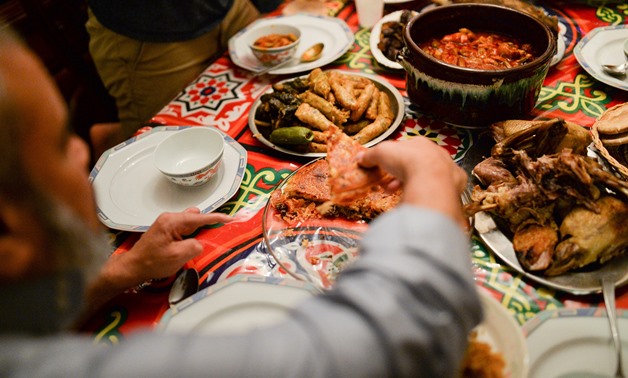
The Egyptian-American Elhariry family takes part in Iftar dinner during Ramadan in Manalapan, New Jersey, on May 28, 2017 - REUTERS
CAIRO – 6 May 2019: As the holy month of Ramadan begins, many patients with diabetes who insist on fasting are advised to follow general dietary guidelines to stay health and avoid high blood sugar levels.
The Diabetes and Ramadan International Alliance (DaR) provides practical guidelines advised by healthcare professionals to help people with diabetes fast while minimizing the risk of complications.
As part of its nutrition plan, DaR advised to avoid 10 bad eating habits that could raise sugar levels in blood during the holy month of Ramadan.
Below are some mistakes to avoid during Ramadan:
1- Having several small meals between Iftar (meal consumed at dusk to break the fast) and Suhur (pre-dawn meal).
2- Eating a 1,500-calorie meal at Iftar raises sugar level and increases weight.
3- Taking huge amounts of sugars and processed carbohydrates at and after Iftar.
4- Eating lots of fried food, especially when using high-fat industrial oils such as: palm oil and coconut oil.
5- Sleeping for long periods of time would increase weight. It is advisable to rest before Iftar; however, people with diabetes are advised to avoid sleeping during this period in order to remain alert to signs of hypoglycemia.
6- Eating huge amounts of high-carb foods like sugar, potatoes, rice and wheat products at Suhur meal raises sugar level in blood.
7- Low physical exercise would also negatively affect our health and lead to an increase in weight.
8- Eating the Suhur meal early would lead to a low sugar level in blood especially during long fasting hours.
9- That’s why it is advised for people with diabetes to take the pre-dawn meal as late as possible.
10- Eating too fast during both meals will lead to an increase in weight and makes one feel full after only 15-30 minutes of eating.

Comments
Leave a Comment